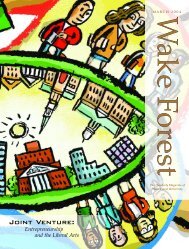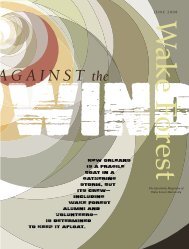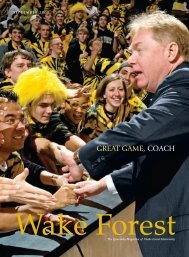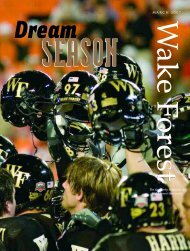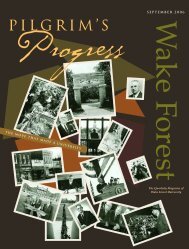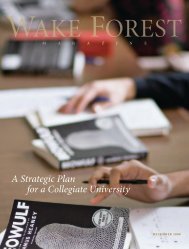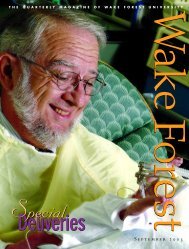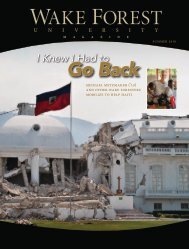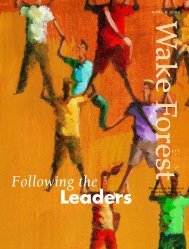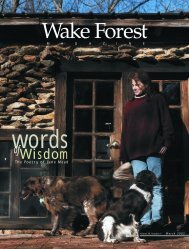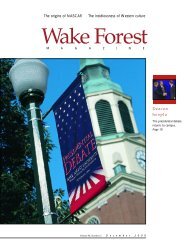Wake Forest Magazine, June 2009 - Past Issues - Wake Forest ...
Wake Forest Magazine, June 2009 - Past Issues - Wake Forest ...
Wake Forest Magazine, June 2009 - Past Issues - Wake Forest ...
Create successful ePaper yourself
Turn your PDF publications into a flip-book with our unique Google optimized e-Paper software.
encouragement and inspiration,” says Baxley,<br />
who retired in 2004. “He was unflagging in<br />
his dedication to his students and to his research.<br />
I always knew he was a good teacher,<br />
and I got to hear it firsthand from my son,<br />
Paul (’91), when he was in one of Fred’s<br />
classes. I saw it for myself when he was kind<br />
enough to let me make up the deficiency of<br />
never having a number theory course by attending<br />
his class one semester.”<br />
Tammy Pausch Mason (’81) took every<br />
math course Howard taught during her four<br />
years as an undergraduate and credits him<br />
with her decision to major in math and pursue<br />
a career in education. “He was a gifted<br />
and caring teacher, who knew his stuff and<br />
knew how to convey understanding of each<br />
concept to his students,” says Mason, who is<br />
now an instructional technology specialist<br />
with the Lynchburg City Schools in Lynchburg,<br />
Virginia. “I would often go talk with him<br />
about my classes or other issues, and he would<br />
always listen with great care and provide<br />
meaningful feedback.”<br />
Mark Ginn (’88, MA ’90), chair and associate<br />
professor of mathematics at Appalachian<br />
State University, had Howard for several<br />
classes as an undergraduate and a graduate<br />
student. “I was heavily influenced by him,”<br />
Ginn says. “He was a definite role model in his<br />
professionalism. He had a real knack of giving<br />
students just enough help, but not too much,<br />
so that you could learn to solve problems on<br />
your own.”<br />
Howard’s soft-spoken, mild-mannered,<br />
professorial nature belies a dry sense of humor,<br />
often played out anonymously over the years<br />
in the math department offices. There was<br />
the time in the early ’90s during an arduous<br />
search for a new faculty member when the<br />
search committee received a phenomenal<br />
application from one “I.M.A. Plushbottom”<br />
who held the BA, BS, MA, MS, MBA, MD,<br />
and Ph.D. from “PU.” It was accompanied<br />
by a recommendation letter from his thesis<br />
adviser, who allowed that Plushbottom was a<br />
terrible teacher—who would fit in perfectly at<br />
<strong>Wake</strong> <strong>Forest</strong>. The letters—and a photograph<br />
of Plushbottom that bore an uncanny resemblance<br />
to Howard—broke the tension of<br />
the search.<br />
Then there was the time in the early 1980s<br />
when esteemed biology professor Charles<br />
Allen ('39, MA '41), heading up a committee<br />
on space allocations, recommended that<br />
the math department move to Wingate Hall,<br />
because its space requirements were “Spartan.”<br />
Soon a sign appeared in the math department<br />
office welcoming visitors to “Sparta.” The<br />
sign also had arrows pointing toward Tribble<br />
Hall—“Athens, x meters”; Wait Chapel— “Jerusalem,<br />
y meters”; and down to the lower<br />
floors where the Babcock Graduate School<br />
of Management then had its offices—“Hades,<br />
z meters.” Howard never admitted responsibility,<br />
but it bore all the traits of his calm<br />
demeanor and sense of humor.<br />
Howard was the graduate student adviser<br />
for thirty years and oversaw the thesis<br />
research of more than twenty graduate<br />
students. His own research interests lie in<br />
number theory, combinatorial analysis, and<br />
Fibonacci numbers. He is a past president of<br />
the Fibonacci Association, an international<br />
mathematics organization devoted to the<br />
study of special number sequences. As a sign<br />
of the esteem in which he’s held in the international<br />
mathematics community, Karl Dilcher,<br />
a current board member of the Fibonacci<br />
Association, traveled from Nova Scotia to<br />
Howard’s retirement dinner in April to praise<br />
his influence on him personally and for his<br />
contributions to the Fibonacci Association.<br />
“I will miss interacting with students,” says<br />
Howard, who will still teach one course next<br />
fall. “I’ve enjoyed helping students, being a<br />
friend and mentor, as well as their teacher.<br />
And I’ve enjoyed being an integral part of the<br />
math department.”<br />
—By Kerry M. King (’85)<br />
www.wfu.edu/wowf <strong>June</strong> <strong>2009</strong> 19



